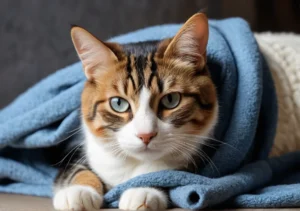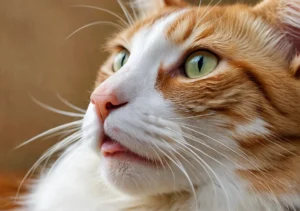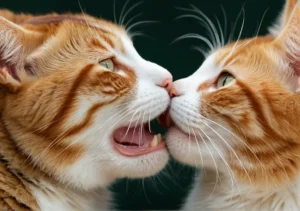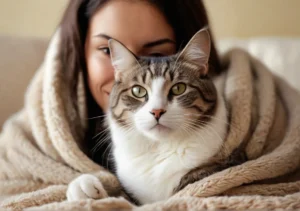Cats are known for their peculiar behaviors, from kneading to purring. One common behavior that baffles many cat owners is their tendency to lick oil. But why do cats lick oil? Let’s uncover the reasons behind this curious feline habit.
In short, cats may lick oil due to its appealing scent or taste, their need for additional nutrients, or as a way to alleviate dry skin. While it may seem strange, there are valid explanations for this behavior. Let’s take a closer look at why cats are drawn to licking oil and what it means for their health and well-being.
Curiosity or Instinct: Why Are Cats Attracted to Oil?
Have you ever caught your feline friend sneaking a lick of oil from a spilled bottle or pan? It might seem like a bizarre behavior, but there could be some reasons behind it. Cats are known for their curious nature, always exploring and investigating their surroundings. Intriguing scents and textures, like those found in oils, could pique their interest, leading them to investigate further by giving it a taste.
Additionally, cats have a strong instinctual drive to groom themselves regularly. Licking their fur helps them keep clean and maintain their coat’s health. Some cats might be drawn to oil due to its texture – perhaps they mistake it for a grooming aid or are simply curious about the foreign substance on their paw.
While curiosity and instinct play a role in cats’ attraction to oil, it’s essential to monitor their behavior around potentially harmful substances. If your cat shows a persistent interest in licking oil or other non-edible items, it’s best to redirect their attention and ensure their safety. After all, we want our furry friends to stay happy and healthy!
Nutritional Needs: Can Oil Provide Essential Nutrients for Cats?
When it comes to a cat’s diet, it’s essential to provide a balanced and nutritious mix of foods to meet their unique needs. While cats are obligate carnivores, meaning their diet primarily consists of meat, small amounts of certain oils can offer additional health benefits.
For example, fish oil is a common supplement that can provide omega-3 fatty acids, which support skin and coat health in cats. Coconut oil is another option that some pet owners incorporate into their cat’s diet, as it may help with digestion and promote a healthy immune system.
However, it’s crucial to consult with your veterinarian before introducing new supplements or oils into your cat’s diet. Excessive amounts of certain oils can lead to digestive issues or other health concerns in our feline friends. Always prioritize your cat’s well-being and seek professional guidance when making dietary changes. Remember, a healthy cat is a happy cat!
Grooming Rituals: Is Oil-Licking a Form of Skincare for Cats?
Have you ever noticed your feline friend indulging in a bit of oil licking? Well, it turns out that cats may actually be onto something when it comes to their grooming rituals. Cats are meticulous groomers, and oil licking could be their way of maintaining healthy skin and a glossy coat.
1. Natural Oils : Cats’ skin produces natural oils that help keep their coat shiny and healthy. By licking these oils, they may be redistributing them across their fur, effectively moisturizing and nourishing it.
2. Removing Dirt : Oil licking can also help cats remove dirt and debris from their fur, acting as a natural cleanser. This self-cleaning process can be beneficial in maintaining a clean and hygienic coat.
3. Regulation of pH : Additionally, oil licking may assist in regulating the pH balance of the skin, preventing issues like dryness or irritation. Cats are instinctively drawn to activities that support their skin health, and oil licking could be one of these habits.
So, next time you catch your cat engaging in a little oil licking, remember that it might just be their way of taking care of their skin and coat naturally.
Potential Risks: Should You Be Concerned About Cats Licking Oil?
While oil licking may have some potential benefits for cats, it’s essential to be aware of any associated risks to ensure your furry friend stays healthy and happy. Here’s what you need to consider:
1. Toxicity Concerns : Some oils can be toxic to cats if ingested in large quantities. It’s crucial to avoid using essential oils or other potentially harmful substances that your cat may lick off themselves.
2. Digestive Issues : Ingesting large amounts of oil can lead to digestive problems in cats, such as diarrhea or vomiting. Keep an eye on your cat’s behavior after oil licking to ensure they are not experiencing any adverse reactions.
3. Skin Irritation : Excessive oil licking may lead to skin irritation or inflammation in some cats. If you notice any redness, itching, or hair loss, it’s best to consult with your veterinarian for proper guidance.
Remember to provide safe alternatives for your cat to groom themselves, such as regular brushing and providing a balanced diet to support their skin and coat health. By being proactive and mindful, you can help your cat enjoy the benefits of grooming while keeping them safe from any potential risks.
Alternatives and Recommendations: How to Encourage Healthier Habits for Cats
If your cat has developed a habit of licking oil, it’s crucial to redirect their behavior to promote a healthier lifestyle. Consider these practical tips to help your feline friend kick the oil habit:
Provide Proper Nutrition : Make sure your cat is getting a balanced diet rich in essential nutrients to prevent them from seeking out alternative sources like oil.
Interactive Toys : Keep your cat engaged and mentally stimulated with interactive toys to distract them from licking oil.
Regular Grooming : Brush your cat regularly to remove excess oil on their fur, reducing the temptation to lick it off.
Consult a Vet : If your cat continues to display unusual behavior, consult a veterinarian to rule out any underlying health issues.
Remember, patience and consistency are key in encouraging healthier habits for your furry companion.
Fun Facts About Feline Behavior: Quirky Insights into Cats and Their Habits
Did you know that cats have a unique sensitivity to different textures on their tongues? This is why some cats may be drawn to licking substances like oil due to the interesting sensation it provides. Cats also have a highly developed sense of taste and smell, influencing their curiosity towards unusual substances.
Another intriguing fact is that cats are meticulous groomers, spending a large portion of their day grooming themselves to maintain cleanliness and regulate body temperature. This grooming behavior can sometimes lead them to explore licking behaviors beyond their own fur. Understanding these quirky insights can help you better comprehend your cat’s behavior and address any unusual habits they may develop.
Remember, each cat is unique, so observing your feline companion’s behaviors and preferences can offer valuable insights into their well-being.
Expert Advice: Insights from Veterinarians on Cat Behavior and Dietary Needs
Have you ever caught your feline friend indulging in a lick of oil? It might seem peculiar, but there can be underlying reasons why cats exhibit this behavior. According to veterinarians, cats may lick oil due to a deficiency in certain nutrients like essential fatty acids. This behavior could be their instinctual way of trying to supplement their diet with the fats they need for optimal health.
Additionally, some cats may simply enjoy the taste and texture of oil. Just like humans have preferences for certain flavors, cats may find the taste of oil appealing. However, it’s important to monitor their intake as excessive consumption can lead to digestive issues.
If you notice your cat frequently licking oil, it’s advisable to consult with your veterinarian. They can provide tailored advice based on your cat’s specific dietary needs and behavior. It’s essential to ensure your cat is receiving a balanced diet to prevent any nutritional deficiencies that may drive them to seek out alternative sources like oil.
Remember, every cat is unique, so understanding your individual pet’s behavior and needs is key to providing the best care possible for them. Stay observant, consult with professionals, and always prioritize your feline companion’s well-being.
Helpful Tip: If you suspect your cat is licking oil due to nutritional deficiencies, consider switching to a high-quality cat food that provides essential nutrients and fatty acids to meet their dietary requirements.
Click here for more information on pet care from the American Veterinary Medical Association.
Understanding Your Cat’s Behavior: The Role of Environmental Enrichment
Cats are curious creatures by nature, and their behavior is often influenced by their environment. Providing adequate mental and physical stimulation through enrichment activities can help curb unusual behaviors like excessive oil licking.
One effective way to keep your cat mentally stimulated is by offering interactive toys, scratching posts, and puzzle feeders. These activities not only engage your cat’s mind but also satisfy their natural instincts to hunt and play.
Incorporating environmental enrichment can also prevent boredom and anxiety, which are common triggers for abnormal behaviors in cats. Remember, a happy and fulfilled cat is less likely to engage in behaviors like excessive licking of oil.
By paying attention to your cat’s behavior and environment, you can create a stimulating and enriching space that promotes their overall well-being. Keep your furry friend engaged, happy, and healthy by providing a supportive environment tailored to their needs.
Bonus Tip: Consider introducing new toys or rotating existing ones regularly to keep your cat engaged and entertained.
Alex, a passionate animal lover, has experience in training and understanding animal behavior. As a proud pet parent to two dogs and three cats, he founded AnimalReport.net to share insights from animal experts and expand his knowledge of the animal kingdom.




